Mike's 2020 Games of the Year
Published on Jan 6, 2021

Oh good god it’s time once again. We actually made it through 2020. This is the time of year when I usually start to look back at the year and mull over all the things I did, the places I went, and the people I saw. I don’t think I’m alone in not wanting to look back at 2020, but rather sprint away from it as quickly as possible into the open arms of Anything Else. However, I do still find it fun to look back at the games that filled my time (even more of it this year, after being laid off), provided me some escape, and left me with fond memories and a desire to return to their worlds.
Here, then, is…
MIKE’S FAVORITE GAMES OF 2020:
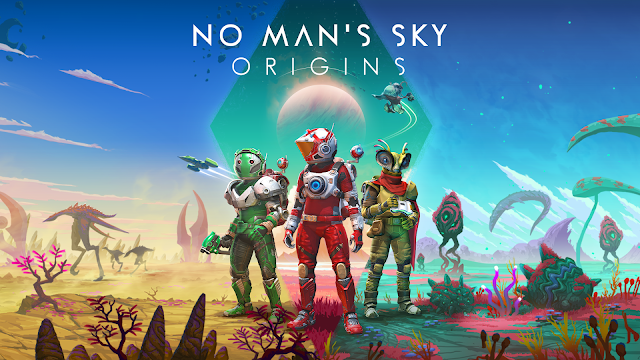
No Man’s Sky Origins
Aw shit, here we go again. For the third year running, I simply could not pass up putting my forever game on the list. Not simply because I keep on playing it, but because the team at Hello Games keeps developing and releasing enormous free updates.
This year’s Origins update provided a new facelift for the game, among other improvements and additions, and so I was called back yet again. I’m not sure if it was the update, the unemployment, the pandemic, or some combination of them all, but what I found when I returned to the galaxy was a more inviting experience than in years previous. I was immediately propelled forward by a dozen or more objectives, and completed them one by one. I finally dug in and completed the story content added back in the Atlas Rises update, found my way to economic prosperity (cobalt flipping is your friend), found my dream ship, fully upgraded myself, my storage, and the storage of my ship, set up bases on a half dozen new planets, and got to work building out my main base with specialists and vehicles and a farm. And there are STILL so many things, like living alien ships and exo mechs(!!), that I haven’t even touched yet!
This is my game, y’all. And it is my sworn duty to appear before you once a year and gush over my other life in space. No Man’s Sky was among the first games this year to provide me with a true escape to another world that I just couldn’t tear myself away from. And I expect it will continue to do so again and again.
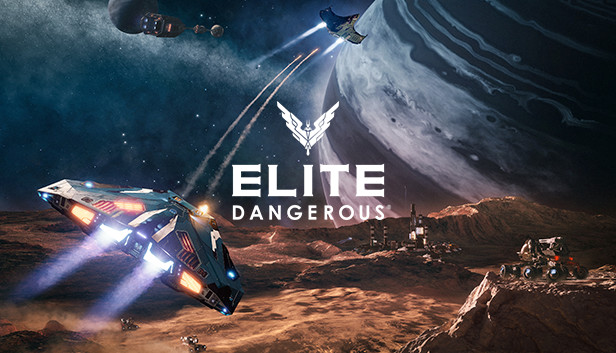
Elite Dangerous
Keeping to a theme, here. This was the year that I finally checked out Elite Dangerous, a game I always suspected was Extremely My Shit, but never made the plunge into. Well, there was no better year in which to plunge than 2020, and Extremely My Shit it was indeed.
I’ll say just a few things that will probably tell you a lot more about me, than they will the game: 1: I was very happy to find that I was able to map the game’s joystick controls to almost exactly the same flight controls as 1995 LucasArts classic TIE Fighter. And 2: When docking at a space station, the game plays Johann Strauss II’s “The Blue Danube.” That was about all I needed to first feel comfortable, and second fall in love.
The thing about Elite Dangerous is that it is very much a “find your own fun” kind of game, similar to No Man’s Sky, but even more hands-off. I like that a lot. If you come into Elite Dangerous looking for a swashbuckling adventure story, you will be disappointed. It isn’t everyone’s thing, but when the setting and the mode call out to me on their own, I love a game that doesn’t care what you do. Give me some systems to interact with if I feel like it, or if I find my way to them, and just let me be. Elite Dangerous is very confident in its systems, its setting, and its simulation in that way, and deservedly so.
On those nights when all I wanted to do was leave the planet, Elite Dangerous was there to perfectly, completely immerse me in exactly that fantasy. There are information packets to be delivered, pirates to fight off, a living to be made, and a galaxy to explore. I’m looking very much forward to my next chance to throttle up, plot a course, engage my Frame Shift Drive, and let the cold, calm galaxy melt my cares away.
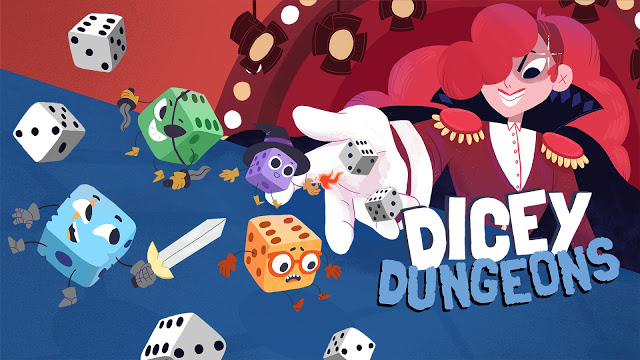
Dicey Dungeons
Coming in right at the wire, I grabbed Dicey Dungeons in a sale the week before Christmas and it frankly blew me away. I slept on Dicey when it came out on PC because I knew a Switch port was coming, and I feel like I remember people generally liking it, but then it sort of faded from memory the way these things do. I feel like those initial discussions of the game did not do it justice. Dicey Dungeons is gorgeous and fun as hell right out of the gate.
There’s a solid blend of story and systems here, with some light setup before you dive into the game itself. Gameplay consists of walking around a simple, board-game-like map screen, and landing on either a battle, a shop, or an item. Shops allow you to buy new items. Items grant you new abilities to use in battle. And battles consist of turn-based dice rolls, where every item/weapon/ability you can use costs a certain number that you must roll. Each playable character (there are 6) also has their own innate special ability, called a Limit Break, that they can employ once a certain amount of damage is taken. Battles are quick and fun, with each of a character’s “episodes” taking around 10-15 minutes to complete.
What makes Dicey Dungeons so immediately fun is the way it puts all of its systems on display for you to see. It would be really easy to make a comparison to Into the Breach here, and honestly if you loved that game and are looking for a quick pitch on Dicey Dungeons, it’s Into the Breach but for RPG combat. It’s slick, it’s gorgeous, and the soundtrack Absolutely Slaps. This is a video-game-ass video game. If you pick it up, and I highly recommend that you do, you will not be disappointed.
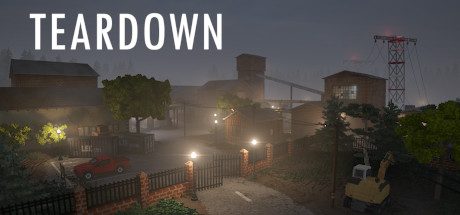
Teardown
After seeing clips of this game in development on Twitter, I couldn’t wait for the chance to finally play it. Well, a shockingly short time after first seeing those tweets, Teardown released in early access on Steam. It’s a voxel-based heist puzzle game with gorgeous lighting, built around destructive environments and precision planning. It’s exactly the head-scratcher I needed on those days when all I wanted to do was close my browser, open my window, and yell.
Okay, so you know how in the IO Interactive Hitman games, a lot of the fun comes from the relationship between planning and execution? Well, that same relationship exists in Teardown. But whereas Hitman places importance on stealth, and encourages improvisation and owning your mistakes, Teardown is all about giving you a consequence-free planning and exploration phase, before finally popping things off and more or less having you try to execute the perfect heist speedrun.
To give an example, early in the game you are tasked with stealing art from some rich dude’s house (hell yeah). The complication here is that all of the relevant pieces are connected to an alarm system. So the minute you grab one of them, the alarm sounds and a countdown starts ticking. And to make matters worse, the pieces are all so far away from one another that there would be no way to grab everything you need and escape in the time provided by just running around the house grabbing art, even if you make use of the game’s many vehicles. As you might guess, this is where the tearing down comes in. In order to make your heist work, you need to first take the time to run around the map blowing holes in walls, placing vehicles in key locations, and otherwise carving an optimal path through the map with your sledgehammer and other tools in order to set the place up for the perfect run.
It’s a little bit Minecraft, a little bit Hitman, a little bit speedrun, and 100% the heist game I have been looking for. Even in its early state, it’s pretty meaty, and keeps managing to surprise me, including with a level involving a lightning storm that flips the whole formula on its head. I can’t wait to see where Early Access takes it from here.
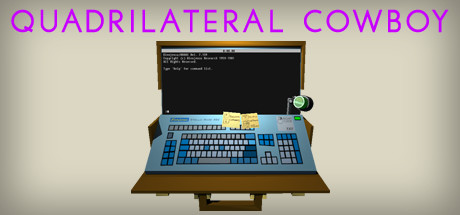
Quadrilateral Cowboy
Super Mario World. TIE Fighter. Boktai. KOTOR. Every once in a while, I find a game that I can’t stop thinking about. A game whose world is so immersive, whose style is so attractive, whose gameplay is so natural and addictive, that I feel I could happily exist inside of it, as a part of it, for all time. I am so happy to report, after sleeping on it for five damn years, that Blendo Games’ Quadrilateral Cowboy is one of those games.
I’d been meaning to play QuadCow for years, but it took Itch.io‘s ‘Bundle for Racial Justice and Equality’ to finally put the game in my hands. Once I jumped in, I fell madly in love, it ate my entire brain, and the rest is history.
There is so much I want to say about this game. So much, that I’m currently planning a video essay about it that will hopefully see the light of day at some point. As small a game as QuadCow is, it’s got charm and character out the wazoo. Your arsenal of tools expands at such a clip that it’s impossible to get bored, something I’m not sure would even be possible without them, as the core mechanic of executing code on your deck is so darn satisfying.
If you’ve heard about the game, you’ve probably heard a pitch that is something along the lines of, “you’re a hacker, and you write code to solve puzzles,” but that surface-level description really does this game a disservice. That, on its own, could have been a fun game, but Quadrilateral Cowboy has so much to say on top of that, wordlessly, about camaraderie, rejection, failure, marginalization, living on the fringes of an uncaring society, and just trying to survive and have a chill time with your friends when you can. Some pretty relatable themes! The game conveys these themes effortlessly in its environments, and especially in the quiet asides between missions. Getting a quick glimpse of your friend’s tiny apartment when you come to pick them up for work grants such massive insight into not only their lives, but the wider world in which you exist.
The game is very good. And if nothing else, there’s an incredible amount of creativity on display here, from the story and characters, to the puzzle design, each new piece of equipment, and even the books and signage you find scattered around various environments.
Quadrilateral Cowboy is a really special experience. All these reasons and more earned it a spot on my 2020 list. I implore you to give it a try.
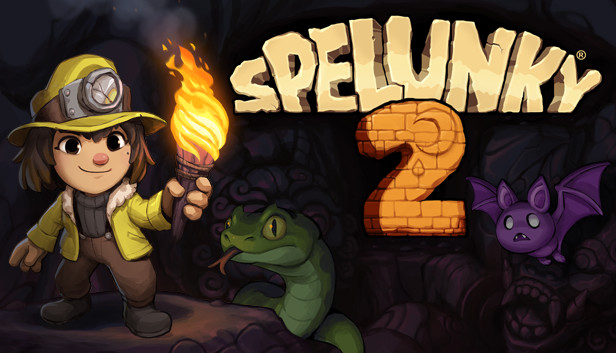
Spelunky 2
It feels like one of the themes of this year was people being excited for Spelunky 2, which has been coming for a while, and then Hades coming in and stealing its roguelike thunder. Which is a shame! Spelunky 2 is a very good game in its own right, and regardless of whether or not time is real anymore, it definitely feels like it occupied an “era” of my year.
The first Spelunky was one of the original indie darlings. It’s considered pretty mechanically perfect to this day, so to iterate on that must have been daunting. However, having played it, I’m glad Derek Yu had more to say in the language of Spelunky, because for whatever reason, I didn’t connect to the first game as deeply as the wider video game community. I never beat the game, never even got terribly far, and never discovered any of its many secrets (I might’ve found the Black Market once). A couple of months later, I was on to the next thing. The latter may eventually end up being the case with Spelunky 2 as well, but in terms of the impression it left on me at launch, I had a much clearer, more immediate connection to this game than its predecessor.
The sequel comes with all the modern trappings you might expect a decade later, from gorgeous visuals to even more stunning music to super fast load times, but there’s also, happily, plenty of new toys to play with as well. The addition of mounts – that is, animal friends that you can ride through the winding caves of the moon – has been a massive one. There are new challenges down there as well, and new risks to weigh against the rewards they propose. One you’ll encounter early on is the “Ghost Jar,” which contains a diamond worth big bucks, but when broken immediately spawns The Ghost, a slow-moving but massive enemy who usually shows up when you’ve spent too much time in a given level, can chase you through walls, and kills you with a single touch.
Like its predecessor, I haven’t yet completed Spelunky 2, and I certainly haven’t found all of its secrets, but I’ve enjoyed the ways in which it has shaken up its old formula, and I’ve generally had an easier time grasping its challenges and making my way through its world. Having said all that, I wouldn’t say it’s an easier game by any means, and there’s plenty to discover and puzzle out anew, even for returning players.
Spelunky 2 is more of the same in the best ways, and full of new stuff without any of that stuff feeling tacked-on. There’s a whole new Spelunky in town. And that feels great.
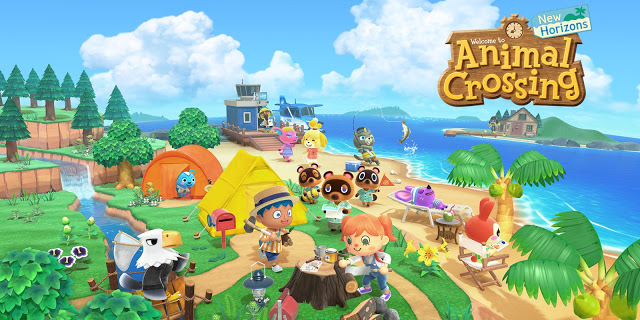
Animal Crossing: New Horizons
It probably isn’t a surprise that the universal salve that is Animal Crossing makes this list. A lot of people were very excited about this game. Funnily enough, I was not one of them! I’d only ever played a little bit of New Leaf before this, and bounced off pretty hard, so I sort of wrote off the whole franchise as something that wasn’t for me.
Well, along comes March, with its brand spanking new pandemic, and working from home until further notice, and my girlfriend who is now staying with me thinks those trailers actually look pretty cute. So I buy it. And what happened? Well, it’s charming as all get-out, and I fell in love. And as I feared, my Stardew Valley farm fell to the wayside for the rest of the year (I’ve since been back in a big way after getting this guide as a Christmas gift).
But what made me fall in love with New Horizons was not just its promise of a breezy life on an island surrounded by adorable animal friends, but its inclusion of co-op in the form of island sharing. The fact that the game locks your Switch to just one island was a sticking point for a lot of people who didn’t necessarily want to share their island with the people with whom they share their Switch. For me, that just meant a quick and easy way to play with my girlfriend, who loves this game even more than I do. Neither of us had any meaningful prior experience or expectations going into New Horizons, so we were happy to figure it all out together.
Playing with my girlfriend on an island that is purely ours, with a few shops, our handpicked neighborhood of animal friends, tons of clothing and crafting options, seasonal events, and ways to surprise each other with gifts was one of my favorite things about this year. If it weren’t for her, I might not have bought this game in the first place, and I definitely would have fallen off of it by now. She still checks in every single day, and leaves presents outside my house, which is a better and more adorable reason to keep coming back than I think the game itself offers me. New Horizons makes it so easy for us to share this nice little world during a time when we feel so trapped. And – cliché as it may sound by now – that’s made it one of the brightest spots in the bleak darkness of 2020.
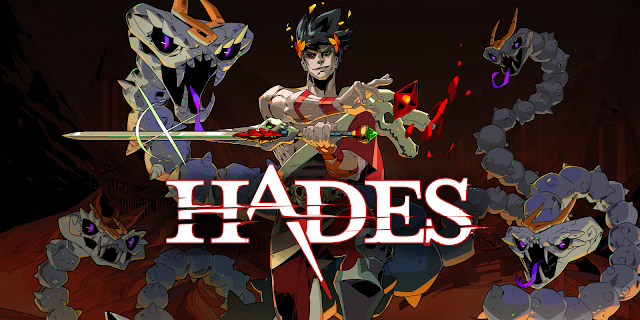
Hades
Yeah. I mean, yeah. Basically, if you’ve been at all aware of the games press’ collective explosion of praise for Hades, then everything you’ve already seen and heard is completely deserved. And if you haven’t…
Hades is an isometric roguelike dungeon crawler from possibly my favorite studio, Supergiant Games, creators of Bastion, Transistor, and Pyre. I have played and loved every Supergiant game to varying degrees, and I truly believe Hades is the best they’ve ever made. I just want to keep playing it.
It really feels like Hades has cracked some kind of mythical roguelike code of rewarding “failure” and incentivizing replay. Playing through a run, you meet new characters, which fills out part of their codex entry, pick new abilities, which fulfills fated prophecies, unlock new weapons, which allows new styles of play, collect items, which unlock new innate powers and other cosmetic changes to the House of Hades, and all along the way, you learn more of the overarching story: why your character, Zagreus, son of Hades, is so hellbent on leaving this historically very-hard-to-leave metaphysical realm.
It feels like the culmination of everything Supergiant has made and learned so far, and that’s no mistake. By their own admission, their style of game development is that every project is informed by the project that came before. Bastion’s contextual narrator is here, as is its collection of ever-unlocking weapons, power-ups, and difficulty boosters. The slowly revealed story and characters and isometric combat of Transistor is here, the ensemble cast of voice actors and grand, branching narrative of Pyre is here, and another powerful, perfect Darren Korb soundtrack plays over all. Hades not only combines, but elevates everything that came before it in true Supergiant fashion. It is the product of a team of artists in their prime.
So yes, everything you’ve heard about this game is true. Every piece of art, every character portrait, every background, is beautiful. Every track, from thumping battle beats to ambient in-betweens, is pure aural gold. Every hit, every kill, every win, and even every loss, feels extremely good. I love the story. I love the writing. I love every character. Even Theseus. He’s such a shithead! It just feels so good to experience this game. I want to be playing it right now.I think I’ll go do that when I’m done here.
Hades. It’s a goddamn force of nature. And you should play it.
Someone should keep an eye on these Supergiant folks. They might just be onto something.
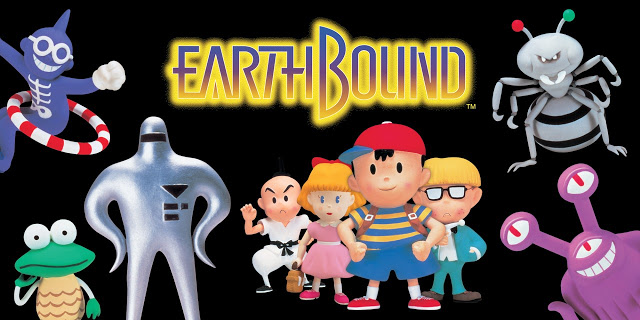
EarthBound
When the New Nintendo 2DS XL came out, I excitedly upgraded from my 3DS XL because of the “New” line’s ability to play Super Nintendo Virtual Console games. This was during the last period in my life that I was unemployed. I grabbed and burned through SNES and Gameboy games whose look and feel and tone I had fallen in love with as a child, but lacked either the funds, the dexterity, or the mental acuity to finish. I finally got through A Link to the Past, before throwing myself into Super Metroid, completing the Mother Brain fight and harrowing escape I’d seen on so many GDQs. I lost dozens of hours to Kirby’s Dream Course. The next item on my list was EarthBound. Then I got a job. Shortly after, I bought myself a Switch, and my 2DS started collecting dust on a shelf.
Hard cut to 2020. After a long period of sinking into Animal Crossing, I realized I still had this gem sitting unfinished on my 2DS XL. It felt like a fitting time to return. When I booted up my old save, I realized I didn’t have a clue where I was or what I was doing. So I made a decision. I would start fresh. Play through all of EarthBound, start to finish, in 2020.
It seemed like a pretty tall order. Fit a big Nintendo JRPG, something I usually don’t have the patience for or interest in, into a single year. But this was EarthBound. Even before I ever played it, I knew it was different. Its art, marketing, and soundtrack just ooze this weird aesthetic that tells you the game is going to be something special.
Well, it’s sitting here on this list, so… I did it. This year, I did it. I experienced all of EarthBound. And reader, it lived up to the hype. From the moment I awoke to a knock at my front door to the end of the end credits, I was delighted, sometimes confused, sometimes frustrated, often surprised, and always enjoying it. I had downloaded a PDF of the official game guide that was included with the cartridge at release, because I know how obtuse old games used to be, and I figured I would need some help, but I didn’t want to rely on it too much. My method was basically to ignore it and play through the game on my own until I got very very stuck, or I was clearly finished with an area, and wanted to make sure I wasn’t missing anything interesting or important. I’m proud to say I was mostly able to complete this game for children unaided, and I would encourage this style of play if you’re looking to jump into this game for the first time.
I honestly don’t know how much I can say about EarthBound that hasn’t already been said in the 25 years since its North American release. The people making this game really knew what they wanted to make, how they wanted it to feel, and what they wanted it to say, and they went and achieved all that and then some.
I think my favorite thing about EarthBound, having finally finished it, is how earnest it is. It has its tongue-in-cheek and sarcastic moments, and I think it’s pretty well known for that kind of humor, but those moments are largely in service of the greater, earnest themes at play. Namely, that children are people with thoughts and ideas and aspirations that are worth listening to and encouraging, that a lot of adults, and often parents, are at best neglectful, and at worst abusive of their own children, and that capitalism sucks. That last one might be a reach, but shitty people only caring about money when they should care about something that actually matters is a recurring theme.
Listen, I don’t want to elevate praise to grandiosity by saying this is one of the best games of all time, because I don’t know what that means, and the game does show its age in places. Combat can be a bit of a slog at times, but the game honestly makes every effort to alleviate those issues with its dead-simple progression loops. When you battle, you get experience. When you get enough experience, you level up. When you level up, you get stronger. Oh, and when you get to the next town, buy the next, more powerful weapon. It’s basically as simple as that. The game really focuses on story over all else, in the best way.
If you’ve never experienced the colorful magic of EarthBound, I really think it’s worth playing. The story, setting, characters, art, and music all collide into an exceedingly lovely, and clearly lovingly crafted, whole. And it is, I think, mostly noob-friendly enough that any perceived intimidating qualities should be excised from your mind.
The experience of playing EarthBound is one that will stay with me for a long time to come, and one that really helped me through this heck year. I really hope you play it if you haven’t. And if you do, get ready for an instant memory! Look at the camera… Ready… Say, “fuzzy pickles!”
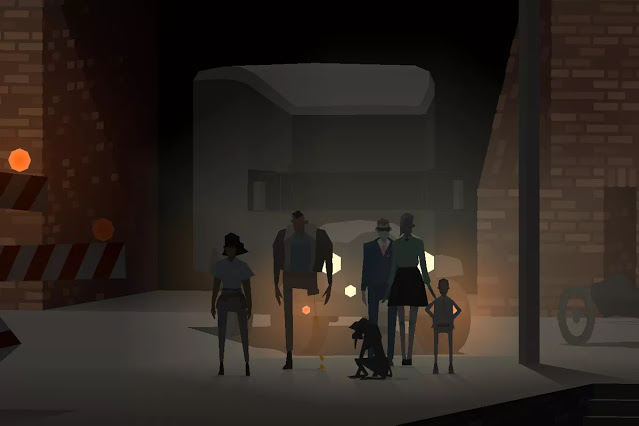
Kentucky Route Zero: TV Edition
If the main theme of this list is “games that had the greatest impact on me in 2020,” then Kentucky Route Zero: TV Edition must top that list. A long time coming since its Kickstarter in 2011 and the initial release of its first act in 2013, this complete edition marked the first time I ever played KRZ.
For those unaware, Kentucky Route Zero describes itself as “a magical realist adventure game about a secret highway running through the caves beneath Kentucky, and the mysterious folks who travel it.” The story is told in parts, five acts, with short interludes between each act.
TV Edition was released in late January 2020 alongside the game’s final act. I grabbed it on Switch as soon as it came out. My buddy Olly, who had been playing it bit by bit over the years, and was super stoked for the final act, was always telling me I should play it. So I was excited to finally have the chance to play the whole thing on Switch. I loved it from the jump. The way it reveled in quiet moments and spoke in poetry, the gorgeous visual design, the incredible cinematic wide shots.
The game’s purposeful slowness inspired in me a kind of reverent gameplay. I would play it in bed when I had a night to myself, on the train during an afternoon commute when the subway cars were less full, anytime I wanted a quiet moment in this world, and could dedicate enough time to becoming completely lost in the Zero’s twists and turns. But that was then.
Kentucky Route Zero has always been a game being constantly born into a changing world. Fitting, then, that I should start playing KRZ in a completely different world than the one in which I finally finished it. Somewhere around April or May (I think? Time is nothing), I finished up Act IV and the interlude that follows it, Un Pueblo de Nada. And then, I don’t know, time just got weird. Summer came and went, and brought with it a wave of new games to check out. Then it was Halloween. Then it was Thanksgiving. Then in December, I started thinking back through my year in games, and thinking about what I could finish or revisit. And so, in early December, after living through nine months of a pandemic, I played the final act.
I won’t spoil the final act, but suffice to say it hits different after your government grossly mishandles its response to a global pandemic, and is at best negligent and at worst abusive toward its citizens. But the finale was developed and released long before (wild how 1-2 months can be considered long) anyone knew what the year would hold. This is just one example of how the game’s overarching themes of debt, and the ways that capitalism – specifically late-stage American capitalism – literally and figuratively destroys people, make it both a perfect amber cast of the period during which it was developed, and an evergreen document that will seem to eerily apply to the present until we finally decide to change and staunch the bleeding. Kentucky Route Zero is not just an extremely good game, it is possibly the only game qualified to be named “Game of the Decade.”
And yet, despite its themes and its relevance, I would gladly play through it again. I probably will! Because the game is, again, despite its themes and its melancholy tone, a salve. It is kind. It is hopeful. It believes that this world and its people are worth fighting for, despite and because of their circumstances. Kentucky Route Zero is the friend that listens to you describing something fucked up that happened to you and says, “yeah, you’re right, that is fucked up,” and then maybe you start a band together. And that’s beautiful.
That’s it, that’s all I have to describe this game and my time with it before devolving into superlatives. This stirring, wandering, meandering, purpose-driven, beautiful game that bookended the worst year of my life. It is my game of the year. And if you haven’t given it your time yet, and if you do, it just might be yours, too.
That’s my list for the year! It was really hard to pare down to ten this year, so I wanted to briefly call out a few other games that provided joy this year, but got slightly edged out by the others:
Honorable Mentions:
Clubhouse Games: 51 Worldwide Classics
Clubhouse Games came at a time when my roommates and I were really missing our usual New York City summer activity of…doing things. So having a big bundle of board games and bowling and darts that we could all gather ’round the TV and play together was really nice. A solid collection. Very chill. Highly recommended.
Panzer Paladin
The latest from another beloved indie developer, Tribute Games! It just barely didn’t make my top 10, but I had a really great time with it. Extremely good soundtrack, look it up. If you’re looking for a solid, straightforward retro platformer, look no further.
Townscaper
This was another Twitter find! There’s no real “game” here in the traditional sense. No tasks or objectives to complete. It’s really just a chill little tool for creating pretty-looking towns. My girlfriend, an illustrator, thought it might be cool as a way to design little towns as references for art pieces. If nothing else, though, it’s also just really nice to make some little towns.
Good Sudoku
Always gotta jump on a new release from Zac Gage. If you’re unfamiliar, the dude is the absolute king of good mobile games. Flipflop Solitaire, SpellTower, Typeshift, Pocket-Run Pool, Really Bad Chess, the list goes on and on. And they’re all bangers. So I was absolutely giddy when he released his take on Sudoku. Good Sudoku adds a bunch of tools that professional-level Sudoku players use in their own esoteric software, makes it all really friendly and easy to learn, and legit teaches you how to be better at Sudoku. It’s the most fun I’ve ever had playing Sudoku, and I feel much better at it than before.
The Flower Collectors
A narrative game in the style of Alfred Hitchcock’s Rear Window? But with animal characters and fascist antagonists? I’m there. A really quick, really solid little mystery game. Fuck the cops, help your neighbors.
There were also plenty of games on my wishlist that I never quite got around to, but hope to play in the coming year:
Missed Connections:
- Umurangi Generation
- In Other Waters
- Anodyne 2
- Mutazione
- Creaks
- Carto
- Noita
- Carrion
- The Solitaire Conspiracy
Did any of your favorites make my list? Any of the opposite? How was your year in video games? Tweet me or some such!
Until next year,
Mike